Malcolm R. Campbell's Blog, page 12
February 12, 2024
‘The Four Winds’ by Kristin Hannah
This novel focuses on the Dust Bowl, a time I think we’re slowly forgetting.
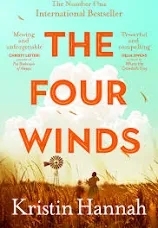 “The Bestselling Hardcover Novel of the Year.–Publishers Weekly
“The Bestselling Hardcover Novel of the Year.–Publishers Weekly
“From the number-one bestselling author of The Nightingale and The Great Alone comes a powerful American epic about love and heroism and hope, set during the Great Depression, a time when the country was in crisis and at war with itself, when millions were out of work and even the land seemed to have turned against them.
“’My land tells its story if you listen. The story of our family.’
“Texas, 1921. A time of abundance. The Great War is over, the bounty of the land is plentiful, and America is on the brink of a new and optimistic era. But for Elsa Wolcott, deemed too old to marry in a time when marriage is a woman’s only option, the future seems bleak. Until the night she meets Rafe Martinelli and decides to change the direction of her life. With her reputation in ruin, there is only one respectable choice: marriage to a man she barely knows.
“By 1934, the world has changed; millions are out of work and drought has devastated the Great Plains. Farmers are fighting to keep their land and their livelihoods as crops fail and water dries up and the earth cracks open. Dust storms roll relentlessly across the plains. Everything on the Martinelli farm is dying, including Elsa’s tenuous marriage; each day is a desperate battle against nature and a fight to keep her children alive.
“In this uncertain and perilous time, Elsa―like so many of her neighbors―must make an agonizing choice: fight for the land she loves or leave it behind and go west, to California, in search of a better life for her family.
“The Four Winds is a rich, sweeping novel that stunningly brings to life the Great Depression and the people who lived through it―the harsh realities that divided us as a nation and the enduring battle between the haves and the have-nots. A testament to hope, resilience, and the strength of the human spirit to survive adversity, The Four Winds is an indelible portrait of America and the American dream, as seen through the eyes of one indomitable woman whose courage and sacrifice will come to define a generation.”
Washington Post Review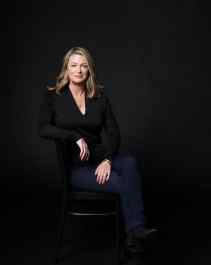 “When The Four Winds picks up again in 1934, we’re deep in the Great Depression, and Hannah lets her story bake under the cloudless sky. A conspiracy of bad weather, bad agriculture and bad government gradually desiccates the entire area, bringing one farm after another to ruin.
“When The Four Winds picks up again in 1934, we’re deep in the Great Depression, and Hannah lets her story bake under the cloudless sky. A conspiracy of bad weather, bad agriculture and bad government gradually desiccates the entire area, bringing one farm after another to ruin.
—Malcolm
February 10, 2024
Southern Gothic
“Southern Gothic is an artistic subgenre of fiction, country music, film, and television that are heavily influenced by Gothic elements and the American South. Common themes of Southern Gothic include storytelling of deeply flawed, disturbing, or eccentric characters who may be involved in hoodoo, decayed or derelict settings, grotesque situations, and other sinister events relating to or stemming from poverty, alienation, crime, or violence.” – Wikipedia
Characteristics of Southern Gothic literature include isolation and marginalization, violence, and crime, sense of place. Southern Gothic has a lot in common with film noir because it has a skewed view of the world in which reality is bent into a general feeling of hopelessness and the smallness of the individual. I like both these genres a lot.
River JordenTHE MIRACLE OF MERCY LAND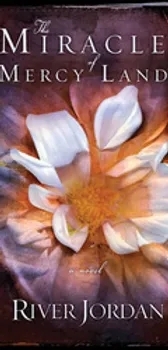 “Two journalists in a small Alabama town discover a mysterious book that makes them confront the past.
“Two journalists in a small Alabama town discover a mysterious book that makes them confront the past.
“If you had the power to amend choices you made in the past, would you—even if it changed everything?
“Mercy Land has made some unexpected choices for a young woman in the 1930s. The sheltered daughter of a traveling preacher, she chooses to leave her rural community to move to nearby Bay City on the warm, gulf-waters of southern Alabama. There she finds a job at the local paper and spends seven years making herself indispensable to old Doc Philips, the publisher and editor. Then she gets a frantic call at dawn—it’s the biggest news story of her life, and she can’t print a word of it.
“Doc has come into possession of a curious book that maps the lives of everyone in Bay City—decisions they’ve made in the past, and how those choices affect the future. Mercy and Doc are consumed by the mystery locked between the pages—Doc because he hopes to right a very old wrong, and Mercy because she wants to fulfill the book’s strange purpose. But when a mystery from Mercy’s past arrives by train, she begins to understand that she will have to make choices that will deeply affect everyone she loves—forever.
“A tremendously well-written tale. River Jordan is a truly gifted author. Highly recommended.” – Davis Bunn, best-selling author”
Harry CrewsThe Gospel Singer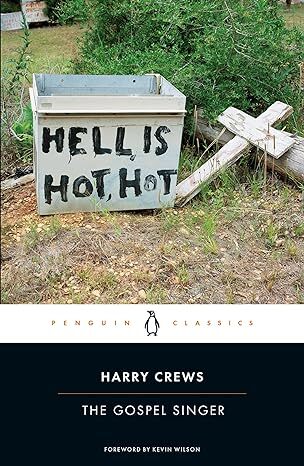 “Golden-haired, with the voice of an angel and a reputation as a healer, the Gospel Singer appeared on the cover of LIFE and brought thousands to their knees in Carnegie Hall. But for all his fame, he is a man in mortal torment that drives him back to his obscure and wretched hometown of Enigma, Georgia. But by the time his Cadillac pulls into Enigma, he discovers an old friend is being held at tenuous bay from a lynch mob. As Harry Crews’s first novel unfolds, the Gospel Singer is forced to give way to his torment, and in doing so he reveals to the believers who have gathered at his feet just how little he is God’s man, and how much he has contributed to the corruption of each of them.”
“Golden-haired, with the voice of an angel and a reputation as a healer, the Gospel Singer appeared on the cover of LIFE and brought thousands to their knees in Carnegie Hall. But for all his fame, he is a man in mortal torment that drives him back to his obscure and wretched hometown of Enigma, Georgia. But by the time his Cadillac pulls into Enigma, he discovers an old friend is being held at tenuous bay from a lynch mob. As Harry Crews’s first novel unfolds, the Gospel Singer is forced to give way to his torment, and in doing so he reveals to the believers who have gathered at his feet just how little he is God’s man, and how much he has contributed to the corruption of each of them.”
“Who put Ellen in the blackgum tree?
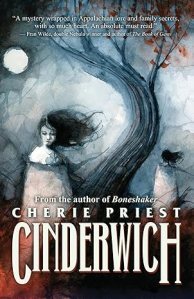 “Decades after trespassing children spotted the desiccated corpse wedged in the treetop, no one knows the answer.
“Decades after trespassing children spotted the desiccated corpse wedged in the treetop, no one knows the answer.
“Kate Thrush and her former college professor, Dr. Judith Kane, travel to Cinderwich, Tennessee in hopes that maybe it was their Ellen: Katie’s lost aunt, Judith’s long-gone lover. But they’re not the only ones to have come here looking for closure. The people of Cinderwich, a town hardly more than a skeleton itself, are staunchly resistant to the outsiders’ questions about Ellen and her killer. And the deeper the two women dig, the more rot they unearth … the closer they come to exhuming the evil that lies, hungering, at the roots of Cinderwich.”
Other Southern Gothic Authors of NoteV. C. Andrews (1923–1986)Dorothy Allison (b. 1949)Ambrose Bierce (1842–1914)Poppy Z. Brite (b. 1967)Larry Brown (1951–2004)Erskine Caldwell (1903–1987)Truman Capote (1924–1984, early works)Fred Chappell (b. 1936)–Malcolm
February 7, 2024
‘The Wind Thief’ by B. B. Griffith
 B. B. Griffith was born and raised in Denver, Colorado and he still wanders Denver to this day. He’s the author of many best-sellers across several series, each unique, but with a common theme of modern magic and mystery. He’s been called an author of contemporary fantasy, an author of modern westerns, and an author of metaphysical thrillers. Sometimes all three at once. His novels have been called “rare and imaginative,” “full of lovable, memorable characters,” and his personal favorite: “A literary breath of fresh air.”
B. B. Griffith was born and raised in Denver, Colorado and he still wanders Denver to this day. He’s the author of many best-sellers across several series, each unique, but with a common theme of modern magic and mystery. He’s been called an author of contemporary fantasy, an author of modern westerns, and an author of metaphysical thrillers. Sometimes all three at once. His novels have been called “rare and imaginative,” “full of lovable, memorable characters,” and his personal favorite: “A literary breath of fresh air.”
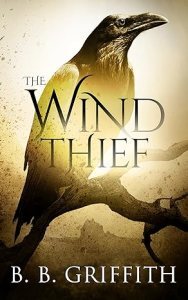 “A dark wind gathers on Chaco Navajo reservation, deep in the heart of New Mexico. Grant Romer, the Keeper of the secret bell, can feel it pulling at his soul. Caroline and Owen work as hard as they can to treat the Navajo, but the dark wind brings a desperation to their clinic that is beyond western medicine.
“A dark wind gathers on Chaco Navajo reservation, deep in the heart of New Mexico. Grant Romer, the Keeper of the secret bell, can feel it pulling at his soul. Caroline and Owen work as hard as they can to treat the Navajo, but the dark wind brings a desperation to their clinic that is beyond western medicine.
“A stranger arrives ahead of the storm. A powerful medicine man from a faraway clan who goes by the name Jacob Dark Sky. He claims he can heal the people of Chaco with a song. Joey Flatwood and a handful of the other old-school Navajo aren’t so sure. They know Dark Sky isn’t what he seems, and that the cure he offers could end up destroying the very people it’s meant to help, right along with the reservation itself.
“To save their home, they will need help from every plane—the land of the living, the land of the dead, and the cold, thin-place between. With the dark wind tearing down everything around them, Grant, Caroline, Owen and Joey turn to Ben Dejooli—known as the Walker—for help.
“But the Walker has gone missing.”
The Series
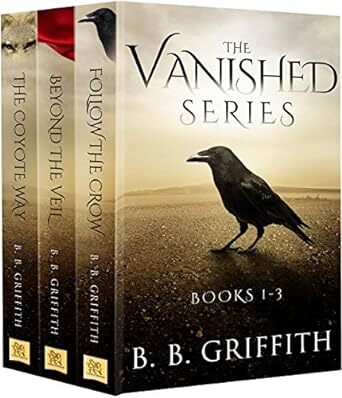
February 4, 2024
‘Into Thin Air,’ By Jon Krakauer
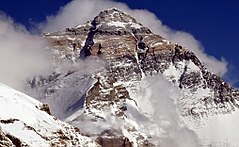 “The 1996 Mount Everest disaster occurred on 10–11 May 1996 when eight climbers caught in a blizzard died on Mount Everest while attempting to descend from the summit. Over the entire season, 12 people died trying to reach the summit, making it the deadliest season on Mount Everest at the time and the third deadliest after the 22 fatalities resulting from avalanches caused by the April 2015 Nepal earthquake and the 16 fatalities of the 2014 Mount Everest avalanche. The 1996 disaster received widespread publicity and raised questions about the commercialization of Everest.” Wikipedia
“The 1996 Mount Everest disaster occurred on 10–11 May 1996 when eight climbers caught in a blizzard died on Mount Everest while attempting to descend from the summit. Over the entire season, 12 people died trying to reach the summit, making it the deadliest season on Mount Everest at the time and the third deadliest after the 22 fatalities resulting from avalanches caused by the April 2015 Nepal earthquake and the 16 fatalities of the 2014 Mount Everest avalanche. The 1996 disaster received widespread publicity and raised questions about the commercialization of Everest.” Wikipedia
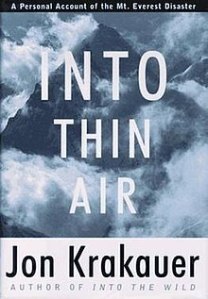 In 2023, 17 climbers died on Mt. Everest, eleven died in 2019, and eight died in 1996. Jon Krakauer wrote the book about the 1996 season, his first time on the mountain as a successful climber and a reporter.
In 2023, 17 climbers died on Mt. Everest, eleven died in 2019, and eight died in 1996. Jon Krakauer wrote the book about the 1996 season, his first time on the mountain as a successful climber and a reporter.
“Into Thin Air: A Personal Account of the Mt. Everest Disaster is a 1997 bestselling nonfiction book written by Jon Krakauer. It details Krakauer’s experience in the 1996 Mount Everest disaster, in which eight climbers were killed and several others were stranded by a storm. Krakauer’s expedition was led by guide Rob Hall. Other groups were trying to summit on the same day, including one led by Scott Fischer, whose guiding agency, Mountain Madness, was perceived as a competitor to Hall’s agency, Adventure Consultants.” – Wikipedia
“Despite being nearly 800 feet shorter than Mount Everest, K2 is a more deadly mountain. Mountaineer Jake Meyer told Insider several critical factors contribute to making K2 so dangerous. On K2, mountaineers face constant 45-degree-angle climbs, no matter the route they take, he said.” Wikipedia.
Krakauer had criticisms the book, but I believe in it was as accurate as he could make it though climbers who did not come off too good slammed the book.
–Malcolm
‘Into Thin Air,’ By Ron Krakauer
 “The 1996 Mount Everest disaster occurred on 10–11 May 1996 when eight climbers caught in a blizzard died on Mount Everest while attempting to descend from the summit. Over the entire season, 12 people died trying to reach the summit, making it the deadliest season on Mount Everest at the time and the third deadliest after the 22 fatalities resulting from avalanches caused by the April 2015 Nepal earthquake and the 16 fatalities of the 2014 Mount Everest avalanche. The 1996 disaster received widespread publicity and raised questions about the commercialization of Everest.” Wikipedia
“The 1996 Mount Everest disaster occurred on 10–11 May 1996 when eight climbers caught in a blizzard died on Mount Everest while attempting to descend from the summit. Over the entire season, 12 people died trying to reach the summit, making it the deadliest season on Mount Everest at the time and the third deadliest after the 22 fatalities resulting from avalanches caused by the April 2015 Nepal earthquake and the 16 fatalities of the 2014 Mount Everest avalanche. The 1996 disaster received widespread publicity and raised questions about the commercialization of Everest.” Wikipedia
 In 2023, 17 climbers died on Mt. Everest, eleven died in 2019, and eight died in 1996. Ron Krakauer wrote the book about the 1996 season, his first time on the mountain as a successful climber and a reporter.
In 2023, 17 climbers died on Mt. Everest, eleven died in 2019, and eight died in 1996. Ron Krakauer wrote the book about the 1996 season, his first time on the mountain as a successful climber and a reporter.
“Into Thin Air: A Personal Account of the Mt. Everest Disaster is a 1997 bestselling nonfiction book written by Jon Krakauer. It details Krakauer’s experience in the 1996 Mount Everest disaster, in which eight climbers were killed and several others were stranded by a storm. Krakauer’s expedition was led by guide Rob Hall. Other groups were trying to summit on the same day, including one led by Scott Fischer, whose guiding agency, Mountain Madness, was perceived as a competitor to Hall’s agency, Adventure Consultants.” – Wikipedia
“Despite being nearly 800 feet shorter than Mount Everest, K2 is a more deadly mountain. Mountaineer Jake Meyer told Insider several critical factors contribute to making K2 so dangerous. On K2, mountaineers face constant 45-degree-angle climbs, no matter the route they take, he said.” Wikipedia.
Krakauer had criticisms the book, but I believe in it was as accurate as he could make it though climbers who did not come off too good slammed the book.
–Malcolm
February 2, 2024
N. Scott Momaday: Obituary
Navarre Scott Momaday (né Mammedaty) (February 27, 1934 – January 24, 2024) was an American and Kiowa novelist, short story writer, essayist, and poet from Oklahoma and New Mexico. His novel House Made of Dawn was awarded the Pulitzer Prize for Fiction in 1969, and is considered the first major work of the Native American Renaissance. His follow-up work The Way to Rainy Mountain blends folklore with memoir. Momaday received the National Medal of Arts in 2007 for his work’s celebration and preservation of Indigenous oral and art tradition. He held 20 honorary degrees from colleges and universities, the last of which was from the California Institute of the Arts in 2023, and was a fellow of the American Academy of Arts and Sciences. Wikipedia
Pulitzer Prize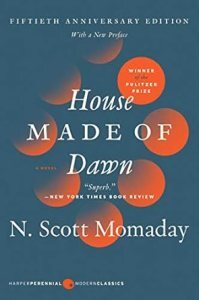 “A special 50th anniversary edition of the magnificent Pulitzer Prize-winning novel from renowned Kiowa writer and poet N. Scott Momaday, with a new preface by the author
“A special 50th anniversary edition of the magnificent Pulitzer Prize-winning novel from renowned Kiowa writer and poet N. Scott Momaday, with a new preface by the author
“A young Native American, Abel has come home from war to find himself caught between two worlds. The first is the world of his grandfather’s, wedding him to the rhythm of the seasons, the harsh beauty of the land, and the ancient rites and traditions of his people. But the other world—modern, industrial America—pulls at Abel, demanding his loyalty, trying to claim his soul, and goading him into a destructive, compulsive cycle of depravity and despair.
“An American classic, House Made of Dawn is at once a tragic tale about the disabling effects of war and cultural separation, and a hopeful story of a stranger in his native land, finding his way back to all that is familiar and sacred.”
Review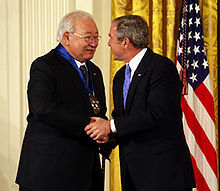 “Beautifully rendered and deeply affecting, House Made of Dawn has moved and inspired readers and writers for the last fifty years. It remains, in the words of The Paris Review, both a masterpiece about the universal human condition and a masterpiece of Native American literature.” Birchbark Books. Momaday receiving the National Medal of Arts from George W. Bush in 2007
“Beautifully rendered and deeply affecting, House Made of Dawn has moved and inspired readers and writers for the last fifty years. It remains, in the words of The Paris Review, both a masterpiece about the universal human condition and a masterpiece of Native American literature.” Birchbark Books. Momaday receiving the National Medal of Arts from George W. Bush in 2007
–Malcolm
January 30, 2024
‘The Waters’ by Bonnie Jo Campbell
 “A master of rural noir returns with a fierce, mesmerizing novel about exceptional women and the soul of a small town.
“A master of rural noir returns with a fierce, mesmerizing novel about exceptional women and the soul of a small town.
“On an island in the Great Massasauga Swamp―an area known as “The Waters” to the residents of nearby Whiteheart, Michigan―herbalist and eccentric Hermine “Herself” Zook has healed the local women of their ailments for generations. As stubborn as her tonics are powerful, Herself inspires reverence and fear in the people of Whiteheart, and even in her own three estranged daughters. The youngest―the beautiful, inscrutable, and lazy Rose Thorn―has left her own daughter, eleven-year-old Dorothy
“Donkey” Zook, to grow up wild.”Donkey spends her days searching for truths in the lush landscape and in her math books, waiting for her wayward mother and longing for a father, unaware that family secrets, passionate love, and violent men will flood through the swamp and upend her idyllic childhood. Rage simmers below the surface of this divided community, and those on both sides of the divide have closed their doors against the enemy. The only bridge across the waters is Rose Thorn.”
From from Reviews“Campbell, who lives outside Kalamazoo, Michigan, is one of American fiction’s leading voices about rural life: the struggle to make a living, the beauty of the wild environment, the thorny and sometimes violent relationships between men and women, and the economic and industrial pressures that threaten everything…filled with vivid descriptions of the diverse flora of this wetlands, The Waters is a realistic novel with a strong thread of fairy tale running through it[.] The Waters builds toward an incredible climactic episode that addresses the great divide running through this imperiled community.” ― Jim Higgins, Milwaukee Journal Sentinel
“Campbell has been exploring hardship, especially the hardships that independent and exploratory women have to work through, for most of her writing career. She knows that unexpected misfortunes have to be put up with, and the question is always whether to do it your own way or to give in to the people around you and embark on a life you do not want…The Waters is a thought-provoking and readable exploration of eccentricity and of all different kinds of love―familial love, romantic love, love of knowledge, love of animals, and love of one’s own environment, even when it is a difficult place to live.” ― Jane Smiley, Los Angeles Times Book Review
From the Writer
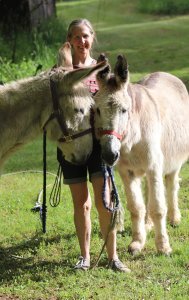 Bonnie Jo Campbell is an American Writer living with her husband and donkeys in rural Michigan.
Bonnie Jo Campbell is an American Writer living with her husband and donkeys in rural Michigan.
Bonnie Jo Campbell is the author of the National Bestselling novel Once Upon a River (Norton, 2011), a river odyssey with an unforgettable sixteen-year-old heroine, which the New York Times Book Review calls “an excellent American parable about the consequences of our favorite ideal, freedom.” The book was optioned and developed into an award-winning feature film directed by Haroula Rose, which debuted in 2020.
Her first novel, Q Road, delves into the lives of a rural community where development pressures are bringing unwelcome change in the character of the land. Campbell’s critically acclaimed short fiction collection American Salvage (Wayne State University Press, 2009) was a finalist for the National Book Award and the National Book Critic’s Circle Award. The collection consists of fourteen lush and rowdy stories of folks who are struggling to make sense of the twenty-first century. She is also the author of Women and Other Animals, which won the AWP prize for short fiction; and the collection Mothers, Tell Your Daughters. Her story “The Smallest Man in the World” was awarded a Pushcart Prize and her story “The Inventor, 1972” was awarded the 2009 Eudora Welty Prize from Southern Review. She is a 2011 Guggenheim Fellow and recipient of the Mark Twain Award from the Society for the Study of Midwestern Literature.
–Malcolm
‘The Waters’ of Bonnie Jo Campbell
 “A master of rural noir returns with a fierce, mesmerizing novel about exceptional women and the soul of a small town.
“A master of rural noir returns with a fierce, mesmerizing novel about exceptional women and the soul of a small town.
“On an island in the Great Massasauga Swamp―an area known as “The Waters” to the residents of nearby Whiteheart, Michigan―herbalist and eccentric Hermine “Herself” Zook has healed the local women of their ailments for generations. As stubborn as her tonics are powerful, Herself inspires reverence and fear in the people of Whiteheart, and even in her own three estranged daughters. The youngest―the beautiful, inscrutable, and lazy Rose Thorn―has left her own daughter, eleven-year-old Dorothy
“Donkey” Zook, to grow up wild.”Donkey spends her days searching for truths in the lush landscape and in her math books, waiting for her wayward mother and longing for a father, unaware that family secrets, passionate love, and violent men will flood through the swamp and upend her idyllic childhood. Rage simmers below the surface of this divided community, and those on both sides of the divide have closed their doors against the enemy. The only bridge across the waters is Rose Thorn.”
From from Reviews“Campbell, who lives outside Kalamazoo, Michigan, is one of American fiction’s leading voices about rural life: the struggle to make a living, the beauty of the wild environment, the thorny and sometimes violent relationships between men and women, and the economic and industrial pressures that threaten everything…filled with vivid descriptions of the diverse flora of this wetlands, The Waters is a realistic novel with a strong thread of fairy tale running through it[.] The Waters builds toward an incredible climactic episode that addresses the great divide running through this imperiled community.” ― Jim Higgins, Milwaukee Journal Sentinel
“Campbell has been exploring hardship, especially the hardships that independent and exploratory women have to work through, for most of her writing career. She knows that unexpected misfortunes have to be put up with, and the question is always whether to do it your own way or to give in to the people around you and embark on a life you do not want…The Waters is a thought-provoking and readable exploration of eccentricity and of all different kinds of love―familial love, romantic love, love of knowledge, love of animals, and love of one’s own environment, even when it is a difficult place to live.” ― Jane Smiley, Los Angeles Times Book Review
From the Writer
 Bonnie Jo Campbell is an American Writer living with her husband and donkeys in rural Michigan.
Bonnie Jo Campbell is an American Writer living with her husband and donkeys in rural Michigan.
Bonnie Jo Campbell is the author of the National Bestselling novel Once Upon a River (Norton, 2011), a river odyssey with an unforgettable sixteen-year-old heroine, which the New York Times Book Review calls “an excellent American parable about the consequences of our favorite ideal, freedom.” The book was optioned and developed into an award-winning feature film directed by Haroula Rose, which debuted in 2020.
Her first novel, Q Road, delves into the lives of a rural community where development pressures are bringing unwelcome change in the character of the land. Campbell’s critically acclaimed short fiction collection American Salvage (Wayne State University Press, 2009) was a finalist for the National Book Award and the National Book Critic’s Circle Award. The collection consists of fourteen lush and rowdy stories of folks who are struggling to make sense of the twenty-first century. She is also the author of Women and Other Animals, which won the AWP prize for short fiction; and the collection Mothers, Tell Your Daughters. Her story “The Smallest Man in the World” was awarded a Pushcart Prize and her story “The Inventor, 1972” was awarded the 2009 Eudora Welty Prize from Southern Review. She is a 2011 Guggenheim Fellow and recipient of the Mark Twain Award from the Society for the Study of Midwestern Literature.
–Malcolm
January 25, 2024
Rising Ark Prices Worry Georgia Residents
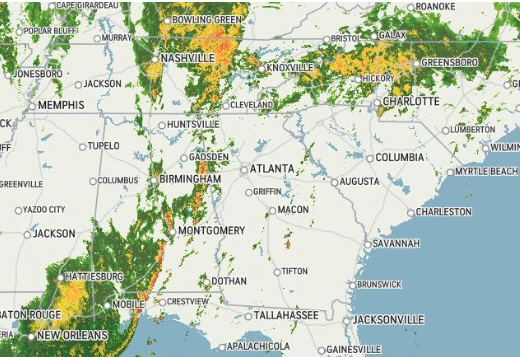
Everywhere floods and people are worried and why shouldn’t they be what with frogs falling from the sky? Lizards, too, in some areas.
Ark prices are rising faster than the flood waters. There are shortages everywhere. Ark handymen are seldom to be found. Where they (the handymen) can be found, hourly rates are $100000 not counting materials–and beer. Most of the handymen are drunk.
A man down in Cedar Town tried to build his own ark out of old washboards, plywood, and stuff out of the kitchen junk drawer. Damn thing sank. A man down in Cave Spring built an ark out of bathtubs and duct tape. Crate got all the way south to Apachilachicola.
Mostly, it’s filed-in basements and old stills gone to ruin.
–Malcolm
January 24, 2024
HOUSE PASSES FIRST FEDERAL BILL SHIELDING JOURNALISTS FROM REVEALING SOURCES
Under the so-called PRESS Act Journalists Won’t be Compelled to Reveal Confidential Sources
FOR IMMEDIATE RELEASE
January 23, 2024 (WASHINGTON)— PEN America applauds passage in the U.S. House of a bill that will protect a fundamental press freedom and would be the first of its kind at the federal level.
(WASHINGTON)— PEN America applauds passage in the U.S. House of a bill that will protect a fundamental press freedom and would be the first of its kind at the federal level.House bill, H.R.4250, known as the PRESS Act (for Protect Reporters from Excessive Suppression Act) is “integral to protect journalists in reporting freely without fear of retaliation or court-ordered disclosure of information,” said Laura Schroeder, Congressional Affairs lead at PEN America, which has advocated with partner organizations for the legislation for several years.
“We thank Congressman Kiley and Congressman Raskin for their work to shepherd this bill forward successfully in the House and we urge an expeditious passage in the Senate,” said Schroeder.
While many states already have such protections, there is no federal law. The bill passed this past Thursday in the House would create a federal shield for journalists so they will not be compelled to reveal their confidential sources at the behest of the government.
About PEN America PEN America stands at the intersection of literature and human rights to protect open expression in the United States and worldwide. We champion the freedom to write, recognizing the power of the word to transform the world. Our mission is to unite writers and their allies to celebrate creative expression and defend the liberties that make it possible.
PEN America stands at the intersection of literature and human rights to protect open expression in the United States and worldwide. We champion the freedom to write, recognizing the power of the word to transform the world. Our mission is to unite writers and their allies to celebrate creative expression and defend the liberties that make it possible.



